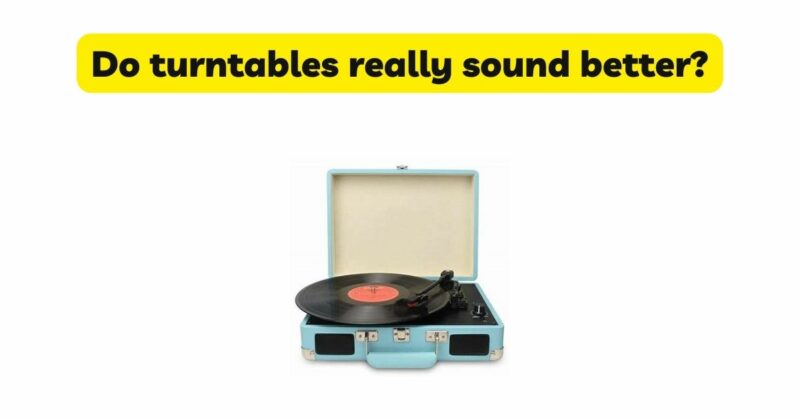The debate between analog and digital audio has been a long-standing topic of discussion among audiophiles and music enthusiasts. With the rise of digital music formats and streaming services, some argue that the convenience and accessibility of digital audio outweigh the perceived benefits of turntables and vinyl records. However, a significant portion of music lovers still swear by the warm, nostalgic sound of vinyl and claim that turntables indeed sound better. In this article, we will explore the factors contributing to the perceived superiority of turntables over digital formats and delve into the science and art behind the analog sound.
- The Allure of Analog Sound
One of the primary reasons why turntables are often perceived to sound better lies in the unique characteristics of analog sound. Analog audio, as captured on vinyl records, preserves the continuous waveforms of the original sound, as opposed to the discrete and sampled nature of digital audio. This continuous representation results in a smoother, more organic sound that many find appealing and immersive. The warmth, depth, and naturalness of analog sound contribute to its allure and emotional impact on listeners.
- Vinyl’s Dynamic Range and Compression
Vinyl records offer a wider dynamic range compared to most digital formats. Dynamic range refers to the difference between the softest and loudest sounds in a recording. Vinyl records, with their wider grooves, can accommodate a broader range of dynamics, which allows for a more faithful reproduction of the original performance. In contrast, digital audio often involves compression to reduce file sizes and make streaming more efficient. This compression, while practical, can lead to a loss of dynamic range and finer details in the music, impacting the overall listening experience.
- The Vinyl Experience: Engagement and Ritual
Listening to vinyl records on a turntable is a multi-sensory experience that engages the listener in a way that digital formats often do not. The act of physically selecting a record, carefully placing it on the turntable, and gently lowering the needle creates a ritualistic and immersive experience. The tactile nature of vinyl creates a deeper connection with the music and the artists, fostering a sense of nostalgia and appreciation for the medium.
- Vinyl’s Unique Sound Coloration
Vinyl records are not without their imperfections, and these imperfections contribute to vinyl’s unique sound coloration. The vinyl medium is susceptible to surface noise, pops, and crackles, which, while considered flaws, can also add character and charm to the music. Some argue that these imperfections create a more human and authentic listening experience, as they remind us of the physical nature of the medium and the history of vinyl as a medium for music consumption.
- The Art of Mastering for Vinyl
Mastering, the final stage of music production, plays a critical role in how a recording sounds on different formats. Vinyl mastering requires specific considerations, as the physical nature of vinyl introduces limitations and unique challenges. Skilled mastering engineers take into account the frequency response, dynamics, and technical constraints of vinyl during the mastering process, ensuring that the music translates well to the analog format. This careful mastering for vinyl can result in a more pleasing and well-balanced sound on vinyl records.
- The Digital Advantages: Clarity and Convenience
While turntable enthusiasts advocate for the analog sound of vinyl, digital audio formats have their undeniable advantages. Digital audio offers pristine clarity and accuracy, as it faithfully reproduces the original digital recording without any degradation or generation loss. Additionally, digital formats provide a convenience that vinyl cannot match. With streaming services and digital libraries, listeners have instant access to a vast library of music on their fingertips, eliminating the need for physical media and storage space.
- The Role of Subjectivity in Audio Perception
It is essential to acknowledge the subjective nature of audio perception. Sound preference varies from person to person, and what may sound better to one listener may not hold the same appeal to another. Personal taste, nostalgia, and emotional connection all influence how we perceive and appreciate music. The perceived superiority of turntables may be rooted in personal preferences and the emotional response evoked by the analog experience, rather than objective technical superiority.
Conclusion
The question of whether turntables really sound better than digital formats is subjective and multifaceted. The analog sound of vinyl records offers a unique, warm, and immersive listening experience that resonates with many music lovers. Factors such as analog’s continuous waveform, wider dynamic range, engagement and ritual, vinyl’s unique sound coloration, and careful mastering for vinyl all contribute to the perceived superiority of turntables. However, digital formats provide unparalleled clarity and convenience, catering to the demands of the modern music landscape.Ultimately, the decision between turntables and digital formats comes down to personal preference, lifestyle, and the listening experience one seeks. Both analog and digital have their merits and limitations. The key lies in appreciating the distinct qualities each format offers and embracing the diversity of options available to enjoy music in the way that resonates most with you. Whether it’s the nostalgia and warmth of vinyl or the convenience and clarity of digital, the ultimate goal is to connect with the music and derive joy from the listening experience.


